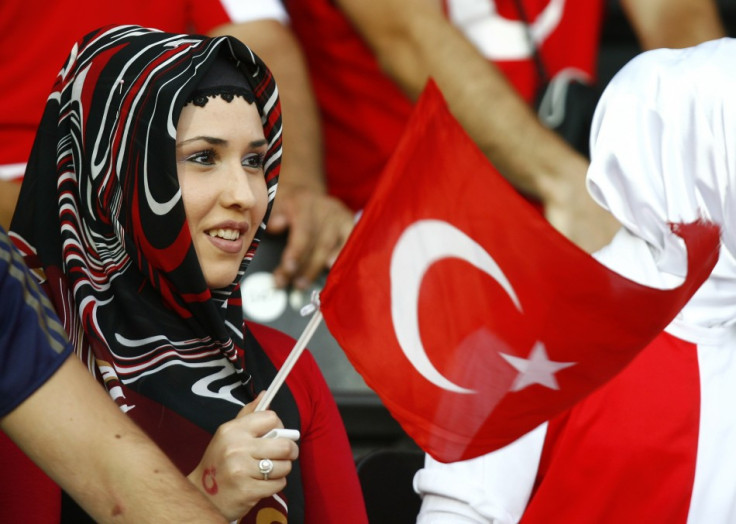Austria threatens to crack down on illegal double passport holders
Dual nationality is mostly banned in the country with new citizens required to relinquish old travel documents.

With his rich Tyrolean accent, Mehmet Altin appears to be a native of the alpine Austrian province. But the campground operator who moved to a sleepy mountain village decades ago could lose his adopted country's citizenship, along with potentially thousands of others targeted by a crackdown on immigrants illegally holding both Turkish and Austrian passports.
Altin's problems in some ways are the result of perceptions in Austria that Turks — among the largest groups of migrants to the country — refuse to assimilate even decades after arriving. Such fears are part of larger Europe-wide concerns that migrants represent a threat to the continent's values.
But a law banning dual nationality in most cases and requiring new Austrian citizens to relinquish their old passports upon naturalization may be punishing the wrong person. Other residents of the village of Ehrwald consider Altin, a Turkish Kurd, one of their own.
The burly 50-year old is as much at home on skis or on mountain tours as anyone else. And although he remains nominally Muslim, Altin's six children — from marriages to an Austrian and then a German wife — are Catholics who don't speak Turkish.
Instead of a law-breaker, Altin says he is a victim. He says Turkish authorities didn't act on requests to cancel his citizenship. But the government of Tyrol province has ruled against him, dismissing documents that appear to support his case that Turkey is responsible for the mix-up.
Proponents of the crackdown on illegal double passport holders have used the results of an April referendum in Turkey that expanded President Recep Tayyip Erdogan's powers to argue that many Turks reject the European Union's democratic ideals. More than 70 percent of Austrian Turks who voted backed the referendum.
While overall Austrian statistics are unavailable, officials in Tyrol say about 30 people — most of them Turks — have been stripped of their Austrian citizenship annually over the past few years for illegally having a second passport. But such violators are discovered only by chance, and politicians pushing the issue now are calling for organized efforts to identify them.
They cite figures from the Austrian wing of Erdogan's AKP party showing that 45 percent of eligible Turkish voters in Austria cast just over 48,000 ballots in the 2015 parliamentary election. That would mean about 106,000 Austrian residents 18 or over are Turkish citizens.
But 2016 Austrian government statistics list only around 93,000, which suggests that 13,000 could be holding on to their Turkish passports without Austrian government knowledge.
Children born with one parent who is Austrian and another with foreign citizenship can maintain both nationalities and passports. Still, far-right Freedom Party official Herbert Kickl speaks of potentially thousands of cases involving residents who gave up their Turkish passports upon acquiring Austrian citizenship and later reapplied clandestinely to be citizens of Turkey — and thus regained the document.
He is calling for "a suspension of all Turkish naturalizations for an unlimited time," and other parties not previously associated with the Freedom's Party anti-immigrant stance are jumping on the bandwagon.
Peter Pilz of the left-leaning Greens party says he has a secret list with 100,000 names of Turks who voted in the April presidential powers referendum that could be checked against Turks with Austrian passports, but has yet to submit it to authorities. And beyond stripping illegals of Austrian citizenship, Interior Minister Wolfgang Sobotka of the centrist People's Party is proposing hefty fines and other punitive measures.
Altin sees the developments as a sideshow aimed at exploiting the anti-immigrant sentiment that has helped vault the Freedom Party to first place in voter popularity ahead of national elections this fall. An Austrian citizen since 1995, he willingly shares evidence backing his argument that the fault for his dual citizenship lies with Turkish authorities.
A 1996 document from the Turkish consulate in Salzburg certified that Altin "has lost Turkish citizenship." A Turkish Interior Ministry document from 2002 he requested after finding out he was still listed as a Turkish national noted that he "has lost Turkish citizenship" as of that date. And his Austrian passport contains dozens of visa stamps that non-citizens receive when they enter Turkey.
But Tyrolean officials are not accepting his argument. A letter last month informing Altin that he was being stripped of his Austrian citizenship because he holds Turkish passport alleges that he kept the document knowingly.
It also disputes his contention that his former homeland may have reclaimed him as a Turkish citizen without his knowledge, stating: "It is not clear what motive the Turkish authorities would have to again naturalize former citizens either secretly or by force."
Officials have told Altin he can reapply for his Austrian passport once they are satisfied he has given up his Turkish one. That means taking stringent German language and other tests that were not in place decades ago. The tests could pose hurdles for less-assimilated Turks, but won't be a problem for him.
But Altin says reapplying would be an admission of guilt. Instead, he is going to court to contest the decision he describes as prompted by a "fight for popularity among politicians that is being carried out on my back."
He can depend on others in Ehrwald for support. While Tyrolians are known to be suspicious of outsiders, village Mayor Martin Hohenegg describes Altin as "not integrated, but truly one of the locals."
© Copyright IBTimes 2025. All rights reserved.





















